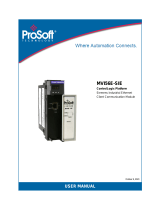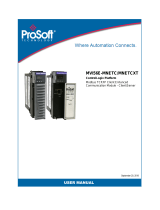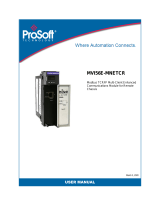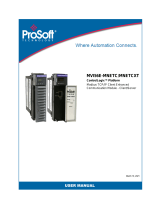Page is loading ...

Your Feedback Please
We always want you to feel that you made the right decision to use our products. If you have suggestions, comments,
compliments or complaints about our products, documentation, or support, please write or call us.
How to Contact Us
ProSoft Technology, Inc.
9201 Camino Media, Suite #200
Bakersfield, CA 93311
+1 (661) 716-5100
+1 (661) 716-5101 (Fax)
www.prosoft-technology.com
Copyright © 2017 ProSoft Technology, Inc. All rights reserved.
MVI56E-SIE User Manual
February 13, 2017
ProSoft Technology ®, ProLinx ®, inRAx ®, ProTalk ®, and RadioLinx ® are Registered Trademarks of ProSoft
Technology, Inc. All other brand or product names are or may be trademarks of, and are used to identify products
and services of, their respective owners.
ProSoft Technology® Product Documentation
In an effort to conserve paper, ProSoft Technology no longer includes printed manuals with our product shipments.
User Manuals, Datasheets, Sample Ladder Files, and Configuration Files are provided at:
www.prosoft-technology.com

Important Safety Information
North America Warnings
A Warning - Explosion Hazard - Substitution of components may impair suitability for Class I, Division 2.
B Warning - Explosion Hazard - When in hazardous locations, turn off power before replacing or rewiring modules.
Warning - Explosion Hazard - Do not disconnect equipment unless power has been switched off or the area is
known to be nonhazardous.
C Suitable for use in Class I, Division 2 Groups A, B, C, and D, T5 Hazardous Locations or Non-Hazardous
Locations.
ATEX Warnings and Conditions of Safe Usage
Power, Input, and Output (I/O) wiring must be in accordance with the authority having jurisdiction
A Warning - Explosion Hazard - When in hazardous locations, turn off power before replacing or wiring modules.
B Warning - Explosion Hazard - Do not disconnect equipment unless power has been switched off or the area is
known to be non-hazardous.
C These products are intended to be mounted in an IP54 enclosure. The devices shall provide external means to
prevent the rated voltage being exceeded by transient disturbances of more than 40%. This device must be used
only with ATEX certified backplanes.
D DO NOT OPEN WHEN ENERGIZED.
Electrical Ratings
Backplane Current Load: 800 mA @ 5 Vdc; 3 mA @ 24 Vdc
Operating Temperature: 0°C to 60°C (32°F to 140°F)
Storage Temperature: -40°C to 85°C (-40°F to 185°F)
Shock: 30 g operational; 50 g non-operational; Vibration: 5 g from 10 Hz to 150 Hz
Relative Humidity 5% to 95% (without condensation)
All phase conductor sizes must be at least 1.3 mm2 and all earth ground conductors must be at least 4mm2.
Markings
RoHS
CE

MVI56E-SIE ♦ ControlLogix Platform Contents
Client Communication Module User Manual
ProSoft Technology, Inc. Page 5 of 172
February 13, 2017
Contents
Your Feedback Please ........................................................................................................................ 2
How to Contact Us .............................................................................................................................. 2
ProSoft Technology® Product Documentation .................................................................................... 2
Important Safety Information ............................................................................................................... 3
1 Start Here 7
1.1 Features .................................................................................................................... 8
1.2 System Requirements ............................................................................................... 9
1.3 Package Contents ................................................................................................... 10
1.4 Setting Jumpers ...................................................................................................... 11
1.5 Installing the Module in the Rack ............................................................................ 12
1.6 Importing the Sample Add-On Instruction ............................................................... 14
1.7 Creating a New RSLogix 5000 Project .................................................................... 15
1.7.1 Creating the Module ................................................................................................ 16
1.7.2 Importing the Add-On Instruction ............................................................................ 18
1.8 Connecting Your PC to the ControlLogix Processor ............................................... 31
1.9 Downloading the Sample Program to the Processor .............................................. 32
2 Configuring the MVI56E-SIE Module 33
2.1 Using ProSoft Configuration Builder Software ........................................................ 34
2.1.1 Setting Up the Project ............................................................................................. 34
2.1.2 Setting Module Parameters ..................................................................................... 37
2.1.3 Module ..................................................................................................................... 39
2.1.4 SIE Client x .............................................................................................................. 43
2.1.5 SIE Client x Commands .......................................................................................... 45
2.1.6 Configuration Examples .......................................................................................... 68
2.1.7 Static ARP Table ..................................................................................................... 85
2.1.8 Ethernet Configuration ............................................................................................ 86
2.2 Connecting the PC to the Module ........................................................................... 87
2.2.1 Setting Up a Temporary IP Address ....................................................................... 87
2.3 Downloading the Project to the Module .................................................................. 91
2.3.1 Using CIPconnect to Connect to the Module .......................................................... 92
2.3.2 Using RSWho to Connect to the Module .............................................................. 102
3 Ladder Logic 103
3.1 Controller Tags ...................................................................................................... 104
3.2 User-Defined Data Types (UDTs) ......................................................................... 106
3.3 Using Controller Tags ............................................................................................ 107
3.4 Controller Tag Overview........................................................................................ 108
3.4.1 SIE.DATA .............................................................................................................. 108
3.4.2 SIE.CONTROL ...................................................................................................... 111
3.4.3 SIE.STATUS ......................................................................................................... 111
3.4.4 SIE.UTIL ................................................................................................................ 112

Contents MVI56E-SIE ♦ ControlLogix Platform
User Manual Client Communication Module
Page 6 of 172 ProSoft Technology, Inc.
February 13, 2017
4 Diagnostics and Troubleshooting 113
4.1 LED Status Indicators ........................................................................................... 114
4.1.1 Scrolling LED Status Indicators ............................................................................ 114
4.1.2 Ethernet LED Indicators ........................................................................................ 115
4.1.3 Non-Scrolling LED Status Indicators .................................................................... 115
4.1.4 Troubleshooting .................................................................................................... 116
4.1.5 Clearing a Fault Condition .................................................................................... 117
4.2 Using the Diagnostics Menu in ProSoft Configuration Builder ............................. 118
4.2.1 Connecting to the Module's Web Page ................................................................ 120
4.2.2 Diagnostics Menu ................................................................................................. 122
4.2.3 Monitoring Module Information ............................................................................. 122
4.2.4 Monitoring Backplane Information ........................................................................ 124
4.2.5 Monitoring Database Information.......................................................................... 125
4.2.6 Monitoring SIE Client Information ......................................................................... 126
4.3 Reading Status Data from the Module ................................................................. 127
4.3.1 Status Data Definition ........................................................................................... 128
4.3.2 Configuration Error Word ...................................................................................... 130
4.3.3 Client Command Errors ........................................................................................ 131
5 Reference 135
5.1 Product Specifications .......................................................................................... 136
5.1.1 General Specifications .......................................................................................... 136
5.1.2 Functional Specifications ...................................................................................... 137
5.1.3 Hardware Specifications ....................................................................................... 137
5.2 Backplane Data Transfer ...................................................................................... 138
5.2.1 Normal Data Transfer Blocks ................................................................................ 140
5.2.2 Special Function Blocks ........................................................................................ 144
5.2.3 Client Driver .......................................................................................................... 153
5.2.4 Client Command List ............................................................................................ 154
5.3 Ethernet Cable Specifications ............................................................................... 155
5.3.1 Ethernet Cable Configuration ............................................................................... 155
5.3.2 Ethernet Performance ........................................................................................... 156
5.4 Using the Optional Add-On Instruction Rung Import ............................................ 157
5.4.1 Before You Begin .................................................................................................. 157
5.4.2 Overview ............................................................................................................... 157
5.4.3 Installing the Rung Import with Optional Add-On Instruction ................................ 158
5.4.4 Reading the Ethernet Settings from the Module................................................... 162
5.4.5 Writing the Ethernet Settings to the Module ......................................................... 164
5.4.6 Reading the Clock Value from the Module ........................................................... 166
5.4.7 Writing the Clock Value to the Module ................................................................. 167
6 Support, Service and Warranty 169
6.1 Contacting Technical Support ............................................................................... 169
6.2 Warranty Information ............................................................................................ 170
Index 171

MVI56E-SIE ♦ ControlLogix Platform Start Here
Client Communication Module User Manual
ProSoft Technology, Inc. Page 7 of 172
February 13, 2017
1 Start Here
In This Chapter
What's New? ........................................................................................... 8
System Requirements ............................................................................. 9
Package Contents ................................................................................. 10
Setting Jumpers .................................................................................... 11
Installing the Module in the Rack ........................................................... 12
Importing the Sample Add-On Instruction.............................................. 14
Creating a New RSLogix 5000 Project .................................................. 15
Connecting Your PC to the ControlLogix Processor .............................. 31
Downloading the Sample Program to the Processor ............................. 32
To get the most benefit from this User Manual, the following skills will be needed:
Rockwell Automation® RSLogix™ software: launch the program, configure
ladder logic, and transfer the ladder logic to the processor
Microsoft Windows: install and launch programs, execute menu commands,
navigate dialog boxes, and enter data
Hardware installation and wiring: install the module, and safely connect
Siemens Industrial Ethernet and ControlLogix devices to a power source and
to the MVI56E-SIE module’s application port(s)

Start Here MVI56E-SIE ♦ ControlLogix Platform
User Manual Client Communication Module
Page 8 of 172 ProSoft Technology, Inc.
February 13, 2017
1.1 Features
ProSoft Configuration Builder (PCB): Windows-based software for
diagnostics, connecting via the module's Ethernet port or CIPconnect®, to
upload/download module configuration information and access
troubleshooting features and functions.
ProSoft Discovery Service (PDS): Utility software to find and display a list
of MVI56E modules on the network and to temporarily change an IP address
to connect with a module's web page.
CIPconnect-enabled: Allows PC-to-module configuration and diagnostics
from the Ethernet network through a ControlLogix 1756-ENBT EtherNet/IP™
module.
Personality Module: An industrial compact flash memory card storing the
module’s complete configuration and Ethernet settings, allowing quick and
easy replacement.
LED Scrolling Diagnostic Display: 4-character, alphanumeric display,
providing messages for status and alarm data, and for processor and network
communication status.

MVI56E-SIE ♦ ControlLogix Platform Start Here
Client Communication Module User Manual
ProSoft Technology, Inc. Page 9 of 172
February 13, 2017
1.2 System Requirements
The MVI56E-SIE module requires the following minimum hardware and software
components:
Rockwell Automation ControlLogix® processor (firmware version 16 or
higher), with compatible power supply, and one free slot in the rack for the
MVI56E-SIE module. The module requires 800 mA of available 5 Vdc power
Rockwell Automation RSLogix 5000 programming software
o Version 16 or higher required for Add-On Instruction
Rockwell Automation RSLinx® communication software version 2.51 or higher
ProSoft Configuration Builder (PCB) (included)
ProSoft Discovery Service (PDS) (included in PCB)
Pentium® II 450 MHz minimum. Pentium III 733 MHz (or better)
recommended
Supported operating systems:
o Microsoft Windows® Vista
o Microsoft Windows XP Professional with Service Pack 1 or 2
o Microsoft Windows 2000 Professional with Service Pack 1, 2, or 3
o Microsoft Windows Server 2003
o Microsoft Windows 7
128 Mbytes of RAM minimum, 256 Mbytes of RAM recommended
100 Mbytes of free hard disk space (or more based on application
requirements)
256-color VGA graphics adapter, 800 x 600 minimum resolution (True Color
1024 x 768 recommended)
Note: The Hardware and Operating System requirements in this list are the
minimum recommended to install and run software provided by ProSoft
Technology®. Other third party applications may have different minimum
requirements. Refer to the documentation for any third party applications for
system requirements.
Note: The module can be installed in a local or remote rack. For remote rack
installation, the module requires EtherNet/IP or ControlNet communication with
the processor.

Start Here MVI56E-SIE ♦ ControlLogix Platform
User Manual Client Communication Module
Page 10 of 172 ProSoft Technology, Inc.
February 13, 2017
1.3 Package Contents
The following components are included with your MVI56E-SIE module, and are
all required for installation and configuration.
Important: Before beginning the installation, please verify that all of the following
items are present.
Qty.
Part Name
Part Number
Part Description
1
MVI56E-SIE Module
MVI56E-SIE
Siemens Industrial Ethernet Client
Communication Module
1
Cable
RL-CBL025
5-foot Ethernet Straight-Through Cable
If any of these components are missing, please contact ProSoft Technology
Support for replacement parts.

MVI56E-SIE ♦ ControlLogix Platform Start Here
Client Communication Module User Manual
ProSoft Technology, Inc. Page 11 of 172
February 13, 2017
1.4 Setting Jumpers
The Setup Jumper acts as "write protection" for the module’s flash memory. In
"write protected" mode, the Setup pins are not connected, and the module’s
firmware cannot be overwritten. Do not jumper the Setup pins together unless
you are directed to do so by ProSoft Technical Support.
The following illustration shows the MVI56E-SIE jumper configuration.
Note: If the module is installed in a remote rack, the Setup pins can be left
jumpered. That way, the module’s firmware can be updated without requiring
physical access to the module.

Start Here MVI56E-SIE ♦ ControlLogix Platform
User Manual Client Communication Module
Page 12 of 172 ProSoft Technology, Inc.
February 13, 2017
1.5 Installing the Module in the Rack
If the ControlLogix processor and power supply have not been installed and
configured, please do so before installing the MVI56E-SIE module. Refer to the
Rockwell Automation product documentation for installation instructions.
Warning: All safety instructions must be followed when installing this or any
other electronic devices. Failure to follow safety procedures could result in
damage to hardware or data, or even serious injury or death to personnel. Refer
to the documentation for each device that will be connected to verify that suitable
safety procedures are in place before installing or servicing the device.
After the placement of the jumpers has been checked, insert the MVI56E-SIE
into the ControlLogix chassis. Use the same technique recommended by
Rockwell Automation to remove and install ControlLogix modules.
ControlLogix system components can be installed or removed while chassis
power is applied and the system is operating. However, please note the following
warning.
Warning: When the module is inserted or removed while backplane power is on,
an electrical arc can occur. An electrical arc can cause personal injury or
property damage by sending an erroneous signal to the system’s actuators. This
can cause unintended machine motion or loss of process control. Electrical arcs
may also cause an explosion when they happen in a hazardous environment.
Verify that power is removed or the area is non-hazardous before proceeding.
Repeated electrical arcing causes excessive wear to contacts on both the
module and its mating connector. Worn contacts may create electrical resistance
that can affect module operation.
1 Align the module with the top and bottom guides, and then slide it into the
rack until the module is firmly against the backplane connector.

MVI56E-SIE ♦ ControlLogix Platform Start Here
Client Communication Module User Manual
ProSoft Technology, Inc. Page 13 of 172
February 13, 2017
2 With a firm, steady push, snap the module into place.
3 Check that the holding clips on the top and bottom of the module are securely
in the locking holes of the rack.
4 Make a note of the slot location. The slot in which the module is installed in
must be identified in order for the sample program to work correctly. Slot
numbers are identified on the green circuit board (backplane) of the
ControlLogix rack.
5 Turn power ON.
Note: If the module is inserted improperly, the system may stop working or may
behave unpredictably.

Start Here MVI56E-SIE ♦ ControlLogix Platform
User Manual Client Communication Module
Page 14 of 172 ProSoft Technology, Inc.
February 13, 2017
1.6 Importing the Sample Add-On Instruction
Note: This section only applies if the processor is using RSLogix 5000 version 16
or higher. If an earlier version is installed, please contact ProSoft Technology for
more information.
Before You Begin
Two Add-On Instructions are provided for the MVI56E-SIE module. The first is
required for setting up the module; the second is optional.
Download the files from www.prosoft-technology.com. Save them to a convenient
location in your PC, such as Desktop or My Documents.
File Name
Description
MVI56ESIE_AddOn_Rung_v1_0.L5X
L5X file containing Add-On Instruction, user defined
data types, controller tags and ladder logic required
to configure the MVI56E-SIE module
MVI56ESIE_Optional_Rung_v1_0.L5X
Optional L5X file containing additional Add-On
Instruction with logic for changing Ethernet
configuration and clock settings.

MVI56E-SIE ♦ ControlLogix Platform Start Here
Client Communication Module User Manual
ProSoft Technology, Inc. Page 15 of 172
February 13, 2017
1.7 Creating a New RSLogix 5000 Project
1 Open the FILE menu, and then choose NEW.
2 Select the ControlLogix controller model.
3 Select REVISION 16.
4 Enter a name for the controller, such as My_Controller.
5 Select the ControlLogix chassis type.
6 Select SLOT 0 for the controller.

Start Here MVI56E-SIE ♦ ControlLogix Platform
User Manual Client Communication Module
Page 16 of 172 ProSoft Technology, Inc.
February 13, 2017
1.7.1 Creating the Module
1 Add the MVI56E-SIE module to the project.
In the Controller Organization window, select I/O CONFIGURATION and click
the right mouse button to open a shortcut menu. On the shortcut menu,
choose NEW MODULE.
This action opens the Select Module dialog box.
2 Select the 1756-MODULE (GENERIC 1756 MODULE) from the list and click OK.
This action opens the New Module dialog box.

MVI56E-SIE ♦ ControlLogix Platform Start Here
Client Communication Module User Manual
ProSoft Technology, Inc. Page 17 of 172
February 13, 2017
3 In the New Module dialog box, enter the following values.
Parameter
Value
Name
Enter a module identification string. Example: SIE
Description
Enter a description for the module. Example: SIEMENS
INDUSTRIAL ETHERNET CLIENT COMMUNICATION MODULE
Comm Format
Select DATA-INT.
Slot
Enter the slot number in the rack where the MVI56E-SIE
module is located.
Input Assembly Instance
1
Input Size
250
Output Assembly Instance
2
Output Size
248
Configuration Assembly Instance
4
Configuration Size
0
Important: The Comm Format DATA – INT must be selected in the dialog box,
otherwise the module will not communicate over the backplane of the
ControlLogix rack.
4 Click OK to continue.
5 Edit the Module Properties. Select the Requested Packet Interval value for
scanning the I/O on the module. This value represents the minimum
frequency at which the module will handle scheduled events. This value
should not be set to less than 1 millisecond. The default value is 5
milliseconds. Values between 1 and 10 milliseconds should work with most
applications.
6 Save the module.

Start Here MVI56E-SIE ♦ ControlLogix Platform
User Manual Client Communication Module
Page 18 of 172 ProSoft Technology, Inc.
February 13, 2017
Click OK to close the dialog box. Notice that the module now appears in the
Controller Organization window.
1.7.2 Importing the Add-On Instruction
1 In the Controller Organization window, expand the TASKS folder and
subfolder until the MAINPROGRAM folder is reached.
2 In the MAINPROGRAM folder, double-click to open the MAINROUTINE ladder.
3 Select an empty rung in the new routine, and then click the right mouse
button to open a shortcut menu. On the shortcut menu, choose IMPORT RUNG.

MVI56E-SIE ♦ ControlLogix Platform Start Here
Client Communication Module User Manual
ProSoft Technology, Inc. Page 19 of 172
February 13, 2017
4 Navigate to the location on the PC where the Add-On Instruction was saved
(for example, My Documents or Desktop). Select the
MVI56ESIE_ADDON_RUNG_V1_X.L5X file.
This action opens the Import Configuration dialog box. Clicking on Tags
Reference will show the controller tags that will be created.
5 If the module is being used in a different slot (or remote rack), select the
correct connection input and output variables that define the path to the
module. If the module is located in Slot 1 of the local rack, this step is not
required.

Start Here MVI56E-SIE ♦ ControlLogix Platform
User Manual Client Communication Module
Page 20 of 172 ProSoft Technology, Inc.
February 13, 2017
6 Click OK to confirm the import. RSLogix will indicate that the import is in
progress:
When the import is completed, the new rung with the Add-On Instruction will
be visible as shown in the following illustration.
The procedure has also imported new user-defined data types, data objects
and the Add-On Instruction for your project.
7 Save the application and then download the sample ladder logic to the
processor.
/








